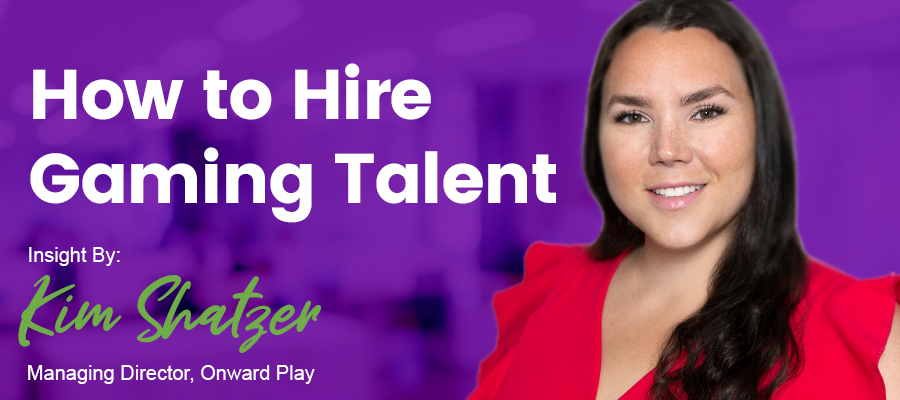
From Esports to VR to video games like Call of Duty, the gaming industry is absolutely flourishing. 2020 saw a record number of purchases and downloads while gamers stayed home amid the pandemic. There are currently no signs of slowing down either, as new technologies are leading to the advent of more gaming options. To keep up with demand, gaming studios are looking to hire the best and brightest professionals for their teams. The result is a candidate-constrained market, which is forcing companies to rethink their hiring practices.
We help companies address this precise need. Our focus is helping gaming studios hire talent quickly and efficiently to ensure they ship their games on time and budget. We have the flexibility to supply talent for direct-hire, project-based, or freelance needs.
The following is a Q&A with Kim Shatzer, Managing Director of Onward Play, to get her view on the industry and find out some best practices for companies looking to hire gaming talent in today’s landscape.
What are candidates looking for in their next role in gaming?
Answer:
First and foremost, candidates want studios to give them the flexibility of working “remote forever or flex onsite.” However, creating games, building esports brands, and mastering extended realities is a highly collaborative process, which is causing a challenge for studios. The producers and studio heads I interact with have told me the fastest, cheapest, and most effective way to create games is to employ an onsite team who can collaborate face to face. It helps studios stay within budget and on schedule for rollouts. The reason behind the majority of emergency client calls we receive is all the same… “We are behind the timeline, please help.”
Secondly, gaming talent wants to evaluate a studio’s perks and benefits early on in the interview process to ensure it meets their needs and holds up to their current package. If the benefits are not similar or better, they won’t consider the offer. Sign-on bonuses, profit-sharing, performance incentives, and 401k match are all important to today’s candidates.
Question:
What is the hottest segment in gaming?
Answer:
VR/AR remains red hot and will continue to thrive through the remainder of the pandemic and beyond. The AR market is projected to grow by one billion users by the end of 2021. In hopes of tapping into this expanding fan base, VR/AR studios are looking to develop more AR products and technologies. This will create a growing demand for VR studios to build out their engineering, game production, design, hardware, marketing, and leadership teams in 2021.
VR talent is also in high demand and hard to pin down. While VR engineers and designers have often explored start-ups or smaller studios due to their entrepreneurial nature and quest for meaningful work, they have now become wary of changing roles and are looking for the stability that a big studio can provide. Another growing shift is AAA game studios quietly looking to build out the VR and mobile medium for their successful existing PC / Console games.
Question:
What are the most in-demand gaming professionals you’re seeing today?
Answer:
The most in-demand gaming talent has to be Gameplay Engineers. After that, it would be Gameplay Designers, Rendering Engineers, Platform Engineers, Technical Artists, and Executive Producers. We continue to see more openings from game studios, film/entertainment companies, and tech companies gamifying their services or products, which is keeping competition for these professionals at an all-time high. I predict that this demand will continue to increase as companies race to create the next big game, Unreal Engine packed film, or extended reality experience.
Question:
What are the biggest challenges you see today for companies trying to hire gaming talent?
Answer:
It once again comes back to demand. Gameplay Engineers, Designers, Unreal, and Unity experts are being called by recruiters every day. Because the market has such a talent shortage, companies must now sell talent on working at their studios. Candidates are no longer the only ones selling themselves on the interview call.
If you’re looking to pry a candidate away from their current role, you will need to sell them on your company culture, educate them on your team’s management style, describe your collaboration process, and get them excited about your next big project that they could be a part of. You want to ensure you are giving potential candidates real reasons to join your team!
Question:
What’s the biggest mistake you see hiring managers make when trying to recruit gaming talent?
Answer:
Far too often, I see hiring managers drag out the interview process. When there’s a failure to properly define the next steps or promptly schedule a follow-up call, it can cause the candidate to lose interest in the position. Keep in mind, their interest in your company is typically at its peak within the first 24 hours after their first interview. Each day you wait is time for them to go on other interviews and receive other offers.
You may find that by the time you’re ready to make an offer, you’re now competing against multiple other companies. This could result in paying a higher price to secure the talent that you could’ve had locked in weeks ago. To avoid getting stuck in this situation, always follow up with qualified candidates within 24-48 hours after your first touchpoint to identify next steps, try to shorten tests and panel interviews, and do your best to keep them engaged during the interview process.
Question:
What are some of the benefits of working with a recruitment firm like Onward Play when searching for gaming talent?
Answer:
The benefit to working with Onward Play is we are well connected within the gaming industry. We’re aware of the gaming talent that is looking for work before they hit the market or even start applying. When you work with us, you are tapping into our database of highly qualified AAA gaming professionals, industry veterans, disrupters, and the next generation of game makers.
Another advantage to working with us is that we have a huge focus on diversity recruitment and sourcing techniques. We have relationships with various gaming associations, nonprofits, and conferences such as Women in Games, ESTA, GAMA, IGDA, Esports Business Network, and more. We can tap into their networks to identify passive talent or pockets of D&I game professional communities. We also have back-channeled marketing and social strategies focused on diverse job boards, HBCU’s, social media platforms, clubs, and networking groups. Due to our focus and relationships, we can assist game studios with hiring the top game makers they need to ensure their IPs are on time, on budget, well maintained, and successful. We also have the ability to find direct-hire, project-based, or freelance talent to staff any gaming needs that our studio clients have.
Question:
What’s the best way to get in touch with you and to learn more about recruiting gaming talent?
Answer:
Please call me directly at (213) 433-3097 or email kim@onwardplay.com.
We have specialized recruiters who work by industry to provide the most knowledgable experience to our clients. I would be glad to put you in touch with someone who will best suit your individual needs.
